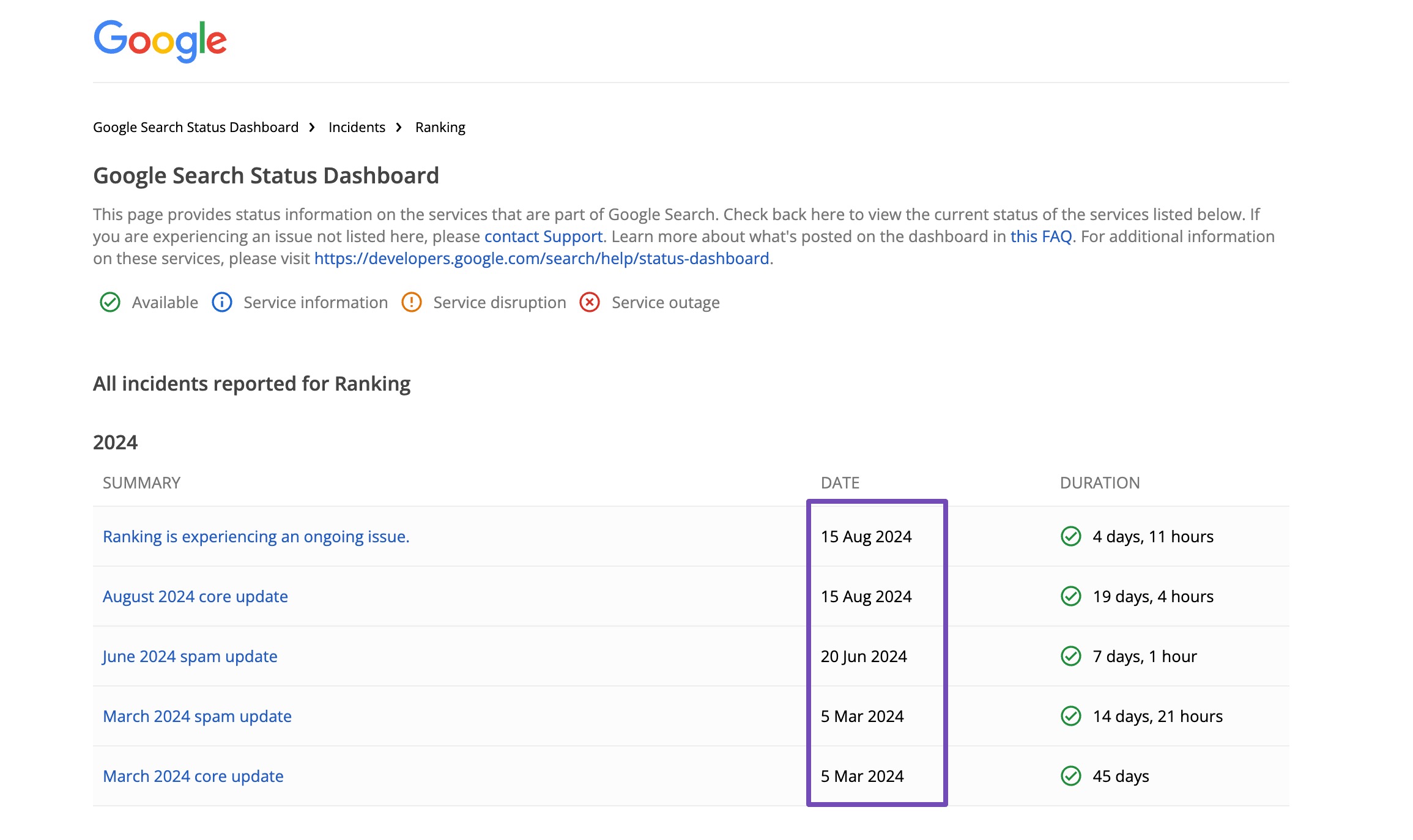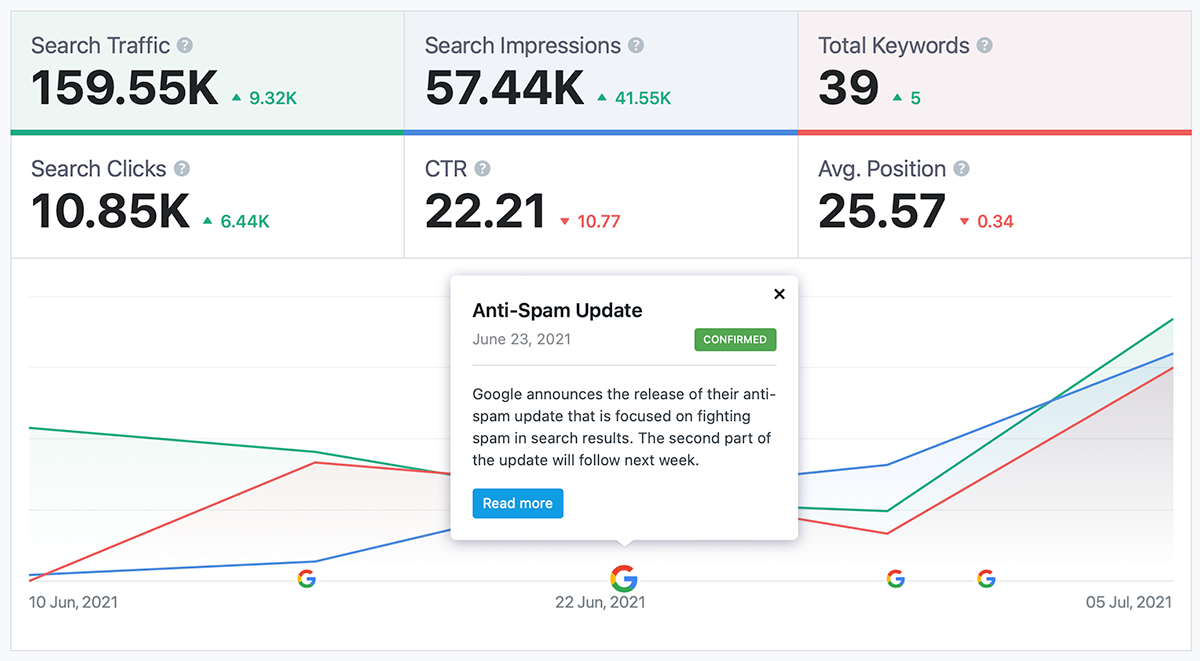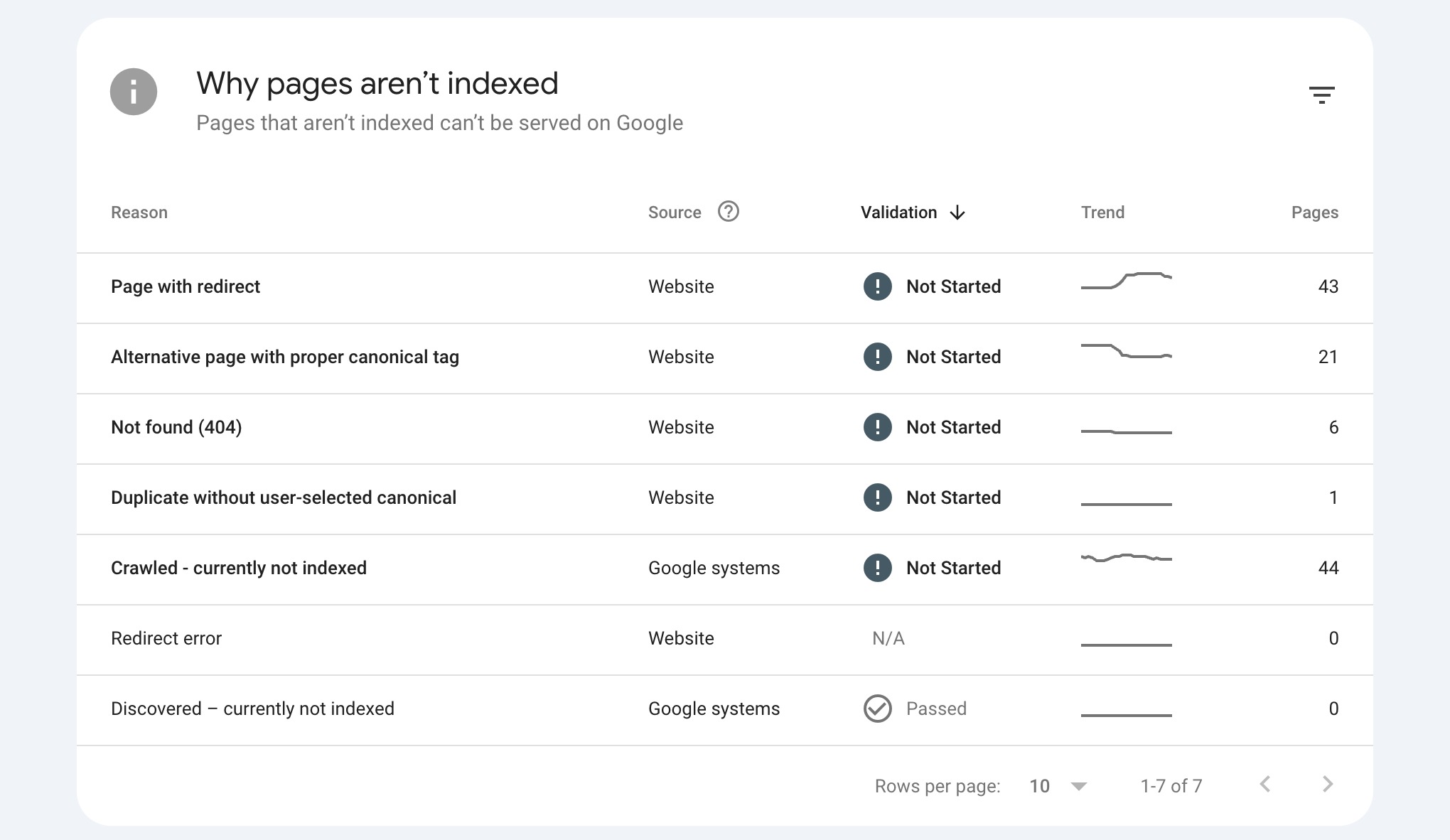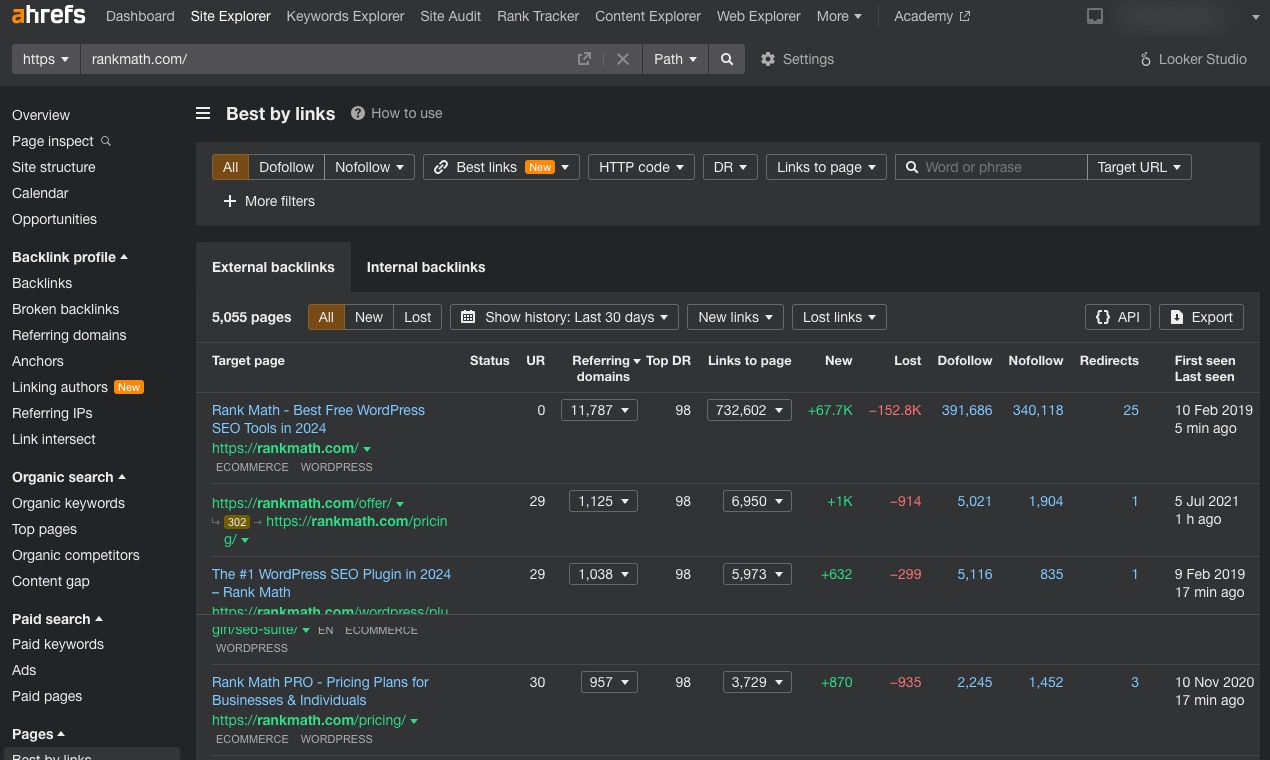Has your website’s Google rankings dropped suddenly, leaving you wondering what went wrong?
You’re not alone.
A drop in rankings often leads to reduced traffic, fewer conversions, and a significant impact on your business’s online visibility.
Understanding the reasons behind the drop in rankings and taking swift action is essential to minimizing losses and regaining your position.
In this post, we’ll discuss the most common reasons rankings fluctuate and, more importantly, a step-by-step process to identify and resolve the issues behind your Google rankings drop.
So, without any further ado, let’s get started.
1 Assess the Severity of the Drop
When your Google rankings drop, the first step is assessing the severity of the decline. A thorough analysis helps you understand the scope of the issue and informs your recovery strategy.
Start by using tools like Google Analytics and Google Search Console to evaluate changes in your site’s traffic and keyword rankings.
These tools provide insights into which keywords have lost visibility and which pages or sections of your site have seen the most significant declines.
By pinpointing exactly where the drop has occurred, you can focus on the areas that need the most attention and avoid unnecessary adjustments to unaffected pages.
Next, determine whether the drop in rankings happened suddenly or if it’s been a gradual decline over time. Identifying patterns is important here.
A sudden drop can indicate a specific cause, like an algorithm update or a technical issue.

In contrast, a slow, steady decline can suggest broader problems, such as content quality, site performance, or outdated SEO strategies.
Recognizing this difference helps you distinguish between temporary fluctuations and more substantial ranking issues that require in-depth analysis and long-term solutions.
2 Evaluate Google’s Algorithm Updates
When your Google rankings drop, one of the first things to investigate is whether a Google algorithm update might be the cause.

Google frequently updates its algorithms to enhance search quality and provide the audience with the most relevant and reliable information. Understanding these updates and their potential impact on your site can help you take targeted action to recover rankings.
To start, keep track of recent Google algorithm updates by monitoring official announcements from Google and following reputable SEO news sources.

Major updates, such as Core Updates, Product Review Updates, or Spam Updates, can significantly impact search rankings.
Rank Math integrates the Google search updates timeline into your Analytics graphs so that you can stop doing the guesswork around evaluating search performance and keep yourself updated with what’s happening in search.

You can also check our Google Updates page and stay updated about any Google updates.
3 Check for Technical Issues
If there is a drop in Google rankings, reviewing any recent changes to your site is essential. Even small adjustments can significantly impact SEO performance.
Technical SEO is the foundation of a well-functioning website. To start, ensure there are no server errors, broken links, or crawling issues that can prevent Google from properly accessing your site. Use tools like Google Search Console to identify these problems.
Additionally, review your site’s mobile usability and Core Web Vitals metrics, especially if you’ve recently undergone a redesign or major update.
Core Web Vitals focus on page speed, interactivity, and visual stability, which are essential for user experience and directly impact rankings.
If page speed has decreased or mobile usability issues have arisen, it’s essential to address these to maintain a positive ranking signal.

If specific pages have lost ranking, verify that they’re still indexed by Google. Start by conducting a site:yourdomain.com search to confirm which pages are visible to search engines.

Next, log into Google Search Console and look for indexing errors, noindex tags, or robots.txt restrictions that might prevent pages from crawling or indexing.

Google needs to be able to crawl and index your pages without interference. Identifying and resolving any issues here helps Google better understand and rank your content, restoring your visibility in search results.
Refer to our dedicated tutorial on technical SEO to identify and solve the issues and recover from the drop in rankings.
4 Analyze Content Updates and Changes
Changes to your content can also cause ranking fluctuations.
Review whether any important content was removed, altered, or duplicated, as these can disrupt the relevance and authority of your pages.

Additionally, examine the structure and formatting of the content. If there have been adjustments to headings, keyword placement, or internal links, these can affect how Google understands and ranks your pages.
Sometimes, well-intended updates can inadvertently reduce SEO effectiveness, so ensure that any content changes align with the best keyword optimization, readability, and on-page SEO practices.
Also, optimize your content for E-E-A-T, as Google places high value on websites that demonstrate Experience, Expertise, Authoritativeness, and Trustworthiness.
Optimizing for E-E-A-T can improve your site’s credibility, strengthen its rankings, and increase user intent.
Refer to our video on E-E-A-T strategies that’ll help you rank higher in search engines.

5 Check Competitor’s Ranking
When you experience a drop in rankings, analyzing your competitors’ performance can provide valuable insights.
Begin by listing your direct competitors—websites that rank for similar keywords and target the same audience. These competitors can give you a baseline to see if changes in Google’s algorithm or other industry-wide factors have impacted rankings across your niche.

Using SEO tools like Semrush or Ahrefs, monitor the rankings of your competitors’ key pages and keywords.
Look at recent trends to see if they’ve experienced a similar decline, especially for high-priority keywords you also target. If competitors have maintained or even improved their rankings while yours have dropped, this may indicate specific issues on your site, such as outdated content, on-page SEO issues, or technical problems.
Take note of any recent changes they may have made, such as updating content, acquiring high-quality backlinks, or enhancing user experience. This analysis can reveal successful SEO practices you might want to adopt or areas where your site can improve.
Refer to our dedicated tutorial on competitive analysis to boost your rankings.
6 Audit Backlinks and Link Profile
Backlinks play a significant role in your website’s search engine rankings. However, not all backlinks are beneficial—some can harm your SEO, especially if they are spammy or irrelevant.
Conducting a backlink audit helps you identify potentially harmful links and focus on building a high-quality link profile to improve your site’s authority and recover lost rankings.
To begin, use SEO tools like Ahrefs or Semrush to assess your backlink profile and detect links that may be harming your site.

Toxic or low-quality links typically come from spammy websites, irrelevant sources, or sites with poor domain authority. Links from these sources can raise red flags for search engines and may even lead to penalties.
Building a strong backlink profile helps boost your site’s authority and reinforces your credibility in search results.

Focus on natural link-building techniques, such as guest blogging on reputable sites, content partnerships, and creating shareable, valuable content that attracts organic links.
Refer to our dedicated tutorial on link building to improve your link profile and further help you recover from the drop in Google rankings.
7 Check the SERPs
When trying to understand why your Google rankings dropped, it’s essential to review the Search Engine Results Pages (SERPs) for your target keywords.
Assess whether the top-ranking pages reflect a change in search intent or content format.
For instance, if informational blog posts are being replaced by product pages or videos, Google may favor different content types to meet user expectations better.
This shift can impact your rankings if your content doesn’t align with the updated user intent. Adapting your content to meet these shifts—such as adding visuals, expanding depth, or improving readability—can help you reclaim lost visibility.
The presence of SERP features (such as featured snippets, People Also Ask boxes, and image carousels) can impact click-through rates and rankings. If a featured snippet has appeared for one of your target keywords, it may be drawing clicks away from organic listings.

Consider optimizing for these features, such as structuring your content to answer questions directly and using headers to organize information.
Wrapping Up: Recovering From Google Rankings Drop
Experiencing a drop in Google rankings can feel overwhelming, but with the right steps, it’s possible to diagnose the cause and take the necessary steps toward recovery.
Remember, fluctuations in rankings happen to every website, and they’re part of the SEO journey.
By staying on top of your site’s health, adjusting as needed, and focusing on high-quality content, you’ll build a stronger SEO foundation.
A strategic, data-driven approach will help you not only recover from a drop in rankings but also improve your long-term performance in search results.
If you like this post, let us know by Tweeting @rankmathseo.

